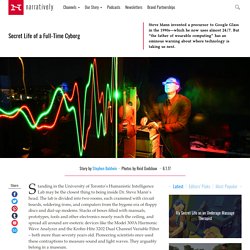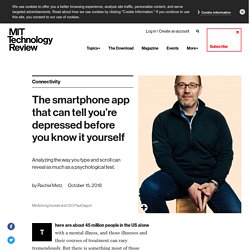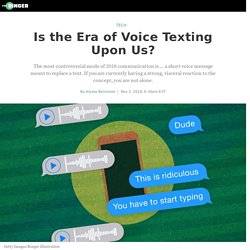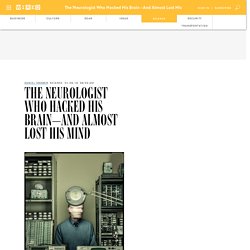

Secret Life of a Full-Time Cyborg. In November 2018, a 66-year-old man named Tommy Thompson was wheeled into Judge Laurel Beatty Blunt’s courtroom in Columbus, Ohio, clad in a dark blue suit and looking like he had just served four years in federal prison.

Thompson’s hair, once thick black curls, had given way to a bald pate, and with a long white beard and piercing eyes, he looked like a slightly hairier Christopher Lee, the actor who played the wizard Saruman in The Lord of the Rings. The smartphone app that can tell you’re depressed before you know it yourself. There are about 45 million people in the US alone with a mental illness, and those illnesses and their courses of treatment can vary tremendously.

But there is something most of those people have in common: a smartphone. A startup founded in Palo Alto, California, by a trio of doctors, including the former director of the US National Institute of Mental Health, is trying to prove that our obsession with the technology in our pockets can help treat some of today’s most intractable medical problems: depression, schizophrenia, bipolar disorder, post-traumatic stress disorder, and substance abuse. Mindstrong Health is using a smartphone app to collect measures of people’s cognition and emotional health as indicated by how they use their phones.
Once a patient installs Mindstrong’s app, it monitors things like the way the person types, taps, and scrolls while using other apps. As it turns out, the behaviors the researchers measured can tell you a lot. What do we actually know about the risks of screen time and digital media? “Yesterday after I wrote to you, I had an attack of asthma,” Marcel Proust wrote to his mother in 1901. “[It] obliged me to walk all doubled up and light anti-asthma cigarettes at every tobacconist’s I passed.” While that sounds a bit crazy by 2018 standards, Proust was far from alone: “Medicated cigarettes marketed for respiratory complaints continued to be endorsed, and smoked, by doctors until well after the Second World War,” writes medical historian Mark Jackson.
Of course, tobacco eventually joined the list of treacherous substances once thought to be healthy and subsequently discovered to be harmful, keeping excellent company alongside radium and mercury. It's enough to make people constantly wonder what else might make it onto the list of friends turned foe. Could coffee be next? There has been a steady stream of worry that digital media could be next. Not a monolith The diverse uses of our screens make it tricky to ask any broad questions.
Violence in games. How to Control a Machine with Your Brain. Brain implant lets paralyzed people turn thoughts into text. A Dark Consensus About Screens and Kids Begins to Emerge in Silicon Valley. SAN FRANCISCO — The people who are closest to a thing are often the most wary of it. Technologists know how phones really work, and many have decided they don’t want their own children anywhere near them.
A wariness that has been slowly brewing is turning into a regionwide consensus: The benefits of screens as a learning tool are overblown, and the risks for addiction and stunting development seem high. The debate in Silicon Valley now is about how much exposure to phones is O.K. “Doing no screen time is almost easier than doing a little,” said Kristin Stecher, a former social computing researcher married to a Facebook engineer. “If my kids do get it at all, they just want it more.” Ms. Recently she has softened this approach. Time. Is the Era of Voice Texting Upon Us? Once upon a time, it was as stylish to hate voicemail as it is to hate Facebook.

In the eyes of digital-savvy critics, spoken audio messages were an inconvenient ’80s relic with embarrassing conventions that dated baby boomers and repulsed millennials. The smartphone was a ubiquitous life accessory that gave society the gift of texting, a far more efficient form of communication. “Think of how long it takes to access your voicemail and listen to one of those long-winded messages,” read a 2013 “digital etiquette” column in The New York Times. “‘Hi, this is so-and-so …’ In text messages, you don’t have to declare who you are, or even say hello.”
Gawker (rest its soul) followed up with a far more radical guide titled “Don’t Leave Me a Voicemail Unless You’re Dying.” But around the same time, major tech companies were working hard to keep a pared-down version of the concept alive. The reasoning behind these guidelines is simple. Why Augmented Reality Pioneer Magic Leap May Have Fallen Off a Cliff. The future is ear: Why “hearables” are finally tech’s next big thing.
The Neurologist Who Hacked His Brain—And Almost Lost His Mind. The brain surgery lasted 11 and a half hours, beginning on the afternoon of June 21, 2014, and stretching into the Caribbean predawn of the next day.

In the afternoon, after the anesthesia had worn off, the neurosurgeon came in, removed his wire-frame glasses, and held them up for his bandaged patient to examine. “What are these called?” He asked. Phil Kennedy stared at the glasses for a moment. Then his gaze drifted up to the ceiling and over to the television. Neuralink.